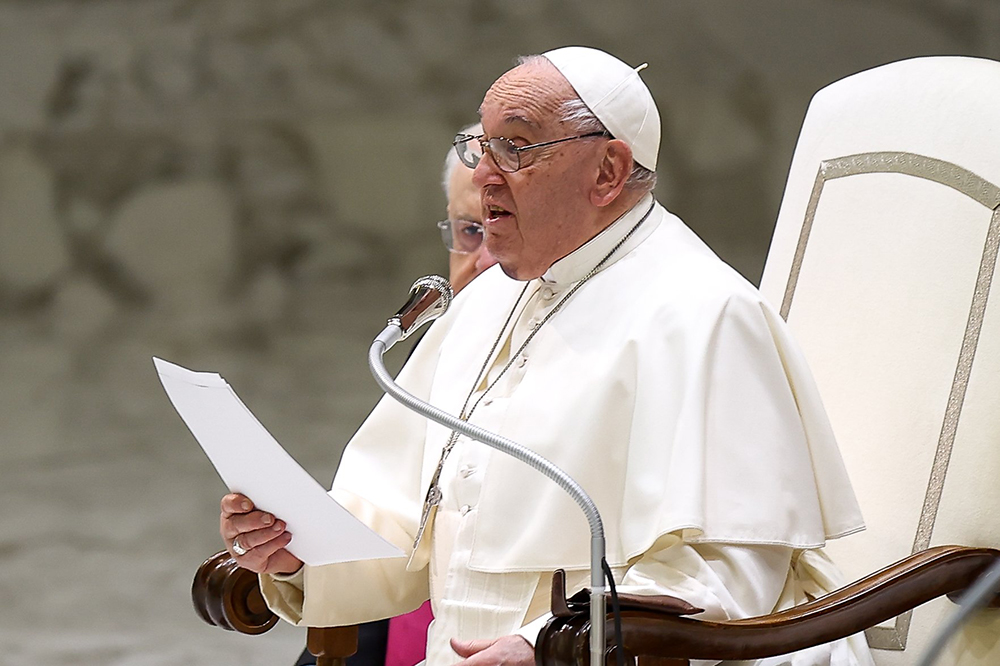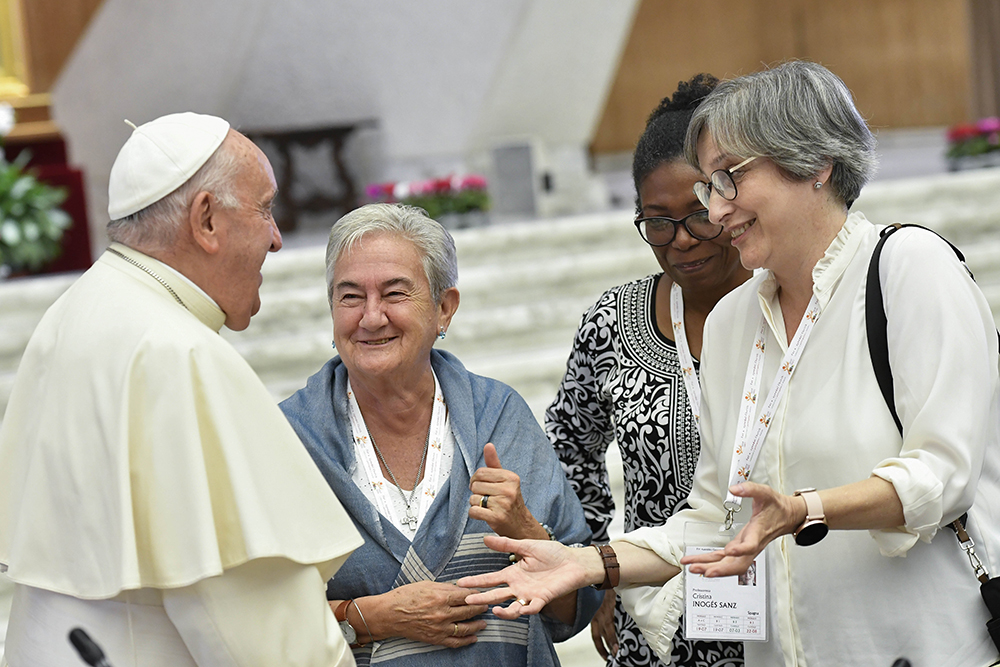Reflections on Pope Francis' address to theologians

Pope Francis talks to visitors during his weekly general audience in the Paul VI Audience Hall at the Vatican Dec. 11, 2024. (CNS/Lola Gomez)
In an address to a gathering of theologians and academic administrators at the Vatican on Monday, Pope Francis spoke about the importance of theology, while also sharing his own desire for its future and extending an invitation to the assembled scholars to make theology accessible to all.
The event, titled "The International Congress on the Future of Theology" and hosted by the Dicastery for Culture and Education, brought together theologians from all six habitable continents. The structure of the two-day event centered on three questions: Where, how and why?
According to the event program, presentations on the "where" of theology focused on the local contexts in which theological reflection unfolds. The "how" centered on interdisciplinarity, drawing on the wisdom, content and methods of what was described as "non-theological reasoning," represented by a panel of experts in fields such as music, literature and film. The "why" attended to the ways theology could serve "society, the church and the world."
Francis' remarks were offered to the gathered participants at the start of the conference, and he said some things that caught my attention.
Advertisement
The first was his use of the metaphor of light to describe how theology functions. He said, "when I think of theology, light comes to mind. Thanks to light, objects emerge from darkness, faces reveal their contours, the shapes and colors of the world finally become visible. Light is beautiful because it makes things appear but without showing itself. Has any of us seen light? No, but we see what light does: it makes things visible."
The image of light illuminating our minds like a stained-glass window is an evocative description for how theology functions in the world. It is also a metaphor appreciated by ancient and medieval theologians, like St. Augustine and St. Bonaventure. Even though light itself is "unseen," it is the condition of the possibility of all sight. The pope notes, "Theology too is like that: it works quietly and humbly so that the light of Christ and his Gospel can emerge."
Another interesting thing the pope mentioned, albeit in passing, was the need for the field to include more women. He said, "There are things that only women understand and theology needs their contribution. An all-male theology is an incomplete theology. We still have a long way to go in this direction."
This comment came after a brief reference to a passage in the Second Book of Kings (22:14-20) in which a prophetess named Huldah is given a recently discovered text in the Temple in Jerusalem and she is able to decipher it for the male priests and scholars. On the one hand, Francis is absolutely correct to note that an "all-male theology is an incomplete theology" and that theology needs the contributions of women.
On the other hand, as I've noted before, the way the pope talks about women still gives me pause. I hesitate to read too much into the selection of this particular biblical passage — in which a woman does the intellectual and interpretative labor without receiving the benefits of the religious or monarchial class whom she serves — but it is worth deeper consideration.
Additionally, the claim that "There are things that only women understand and theology needs their contribution" sounds a bit like "add women and stir" without sufficient consideration for the longstanding and ongoing work of women theologians already. Theology should be, and is being, done by all kinds of scholars from all kinds of backgrounds; but is that theological scholarship, and the substantive insights and criticisms it offers, being received by the "all-male" hierarchy in the church?
"There are things that only women understand and theology needs their contribution. An all-male theology is an incomplete theology. We still have a long way to go in this direction."
— Pope Francis
The issue is less about adding women to something that is presumed by Rome to be a fundamentally male exercise and more about transforming practices and institutions to be more equitable on the basis of gender. Indeed, as the pope says, "We still have a long way to go in this direction."
This brings me to the two last subjects Francis discusses. The first is his named desire that theology help us to "rethink how to think." He explains, "Our way of thinking, as we know, also shapes our feelings, our will and our decisions. A wide heart is accompanied by a wide-ranging imagination and thinking, whereas a shriveled, closed and mediocre way of thinking is hardly capable of generating creativity and courage. I think of the manuals of theology we studied, all closed, all 'museum pieces,' all 'bookish,' without making you think."
I love this point. The pope goes on to decry a kind of theology that is the result of "simplification," which, in his words, "mutilates reality; it gives rise to empty and unilateral thinking and it generates polarization and fragmentation." This is what I would call "pseudo-theology," which is quite popular in certain church circles. A reduction of theology to mere memorization of the Catechism or blind assent to propositional claims or pugilistic embrace of apologetics are all forms of "simplification" that indeed generates polarization and fragmentation. Francis calls the result of this kind of simplification "ideology."
A lot of criticism of academic theology today, even by good faith actors, tends to reverse the pope's criticism, mistakenly believing that "real" theology is the reduction to simplification he cautions against, while "bad" or "false" or, God forbid, "heretical" theology is that which takes reality and its complexities seriously, engages in the interdisciplinary work necessary for serious scholarship, and at times presents legitimate challenges to the status quo by raising important if discomfiting questions.

Pope Francis shares a laugh with some of the women members of the assembly of the Synod of Bishops, including Spanish theologian Cristina Inogés Sanz, left, at the assembly's session Oct. 6, 2023, in the Paul VI Audience Hall at the Vatican. (CNS/Vatican Media)
Francis makes some of these observations himself when he says that "Reality is complex; challenges are varied; history is full of beauty and at the same time marred by evil. When someone cannot or does not want to deal with its dramatic complexity, then he or she easily tends to simplify."
If only more people in the church, especially those entrusted with ministerial leadership, heeded this papal warning, there might be less handwringing and condemnation, name-calling and dismissal, and more appreciation for how the Holy Spirit continues to work in the world generally and in the academy more specifically.
Finally, the pope concluded his remarks with an invitation to make theology "accessible to all." He encourages schools and faculty to welcome older and nontraditional students into programs of study or enrichment. But he also tacitly signals the importance of public theology. Not everybody has the privilege of benefiting from higher education in traditional ways, such as earning advanced degrees. It is incumbent on those of us who are professional theologians and scholars of religion to share discoveries and insights in accessible ways for general audiences and avoid speaking only to ourselves in rarefied spaces like academic conferences and publications.
Despite elitist ecclesiastical stereotypes that seek to restrict access to cutting-edge theology from the laity out of the misplaced and paternalist fear that "they might get confused," I have found that many people desire to think more deeply about their faith and explore the rich, complex and, at times, tensive theological tradition. But the onus is on those who have the advanced degrees, expertise and privilege to study the vast resources of the tradition to do the hard work of making it accessible to broader populations.
If we don't commit ourselves to some form of public theology, all that the rest of the church will have access to are simplified ideologies masquerading as theology, which Francis appears to reject.

No comments:
Post a Comment